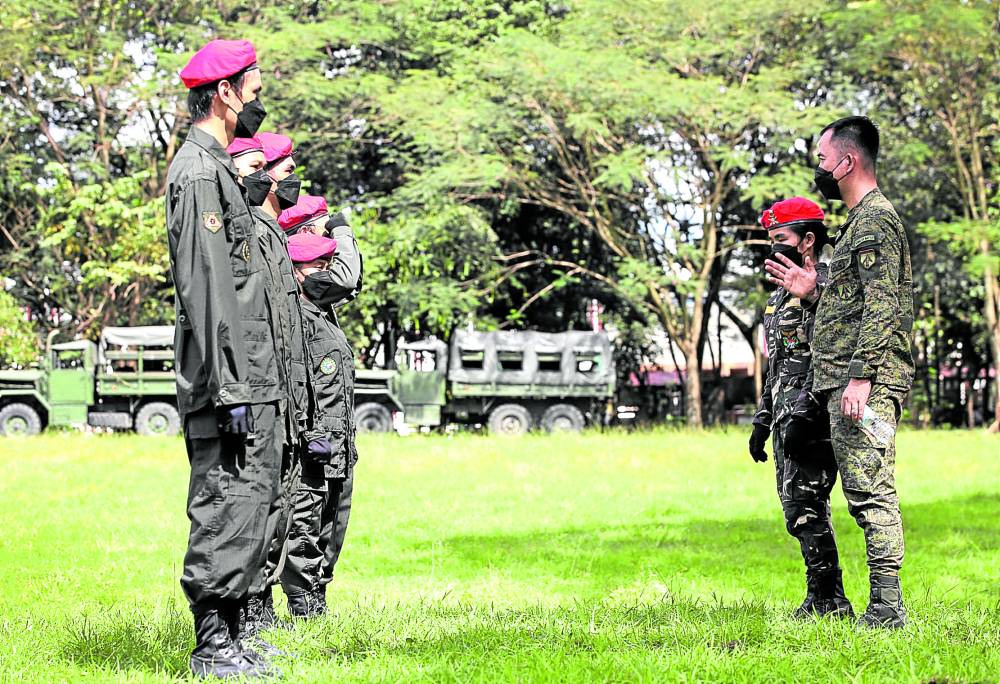
ROTC BY A NEW NAME A bill requiring college students to undergo the National Citizens Service Training Service Program hurdled the House plenary on Wednesday. Those who finish the program will become reservists in the Armed Forces, according to the measure. —LYN RILLON
The House of Representatives on Thursday rushed the passage of a bill establishing a compulsory military and civic training program in college that critics described as essentially just a renaming of the Reserve Officers’ Training Corps (ROTC).
On the last day of session before the holiday break, the chamber approved on second and third reading the proposed law that would require all college and technical-vocational students to undergo the National Citizens Service Training Service Program (NCSTP).
The measure, certified urgent by President Ferdinand “Bongbong” Marcos Jr., was approved by a 276-4 vote on Thursday night with one abstention.
A certification of urgency from Malacañang allows the House or the Senate to forgo the three-day notice rule and approve bills on second and third reading on the same day.
Kabataan Rep. Raoul Manuel attempted to block the proceeding by invoking the burden of the executive branch to prove the urgency of the bill. But his point of order was rejected.
House Bill No. 6687 seeks to repeal the National Service Training Program (NSTP) Act of 2001 under Republic Act No. 9163 and replace it with a new program mandating students to train as cadets for 240 hours in the first two years of their college or technical-vocational education.
Any trainee who finishes the NCSTP “shall have undergone the appropriate citizen competency training which shall include civic duty inculcation, survival and safety techniques, including first-aid administration, and community or mass emergency and disaster response and management.”
At the end of the program, the graduating cadets will be enlisted as reservists of the Armed Forces of the Philippines under the Citizen Armed Force, according to the bill.
Optional ROTC
The program has an optional four-year ROTC component that is open to volunteers who wish to become commissioned officers of either the regular or reserve force of the AFP.
The curriculum “shall be designed in such a way that graduates of the four-year ROTC Program shall be capable of immediate deployment as commissioned officers of the AFP immediately after graduation from the ROTC even as they continue with their baccalaureate degree program.”
The ROTC program of instruction will include “advanced military subjects and courses, practical exercises and field exercises necessary and appropriate for an entry-level officer commission in the AFP.”
In his sponsorship speech on Wednesday night, Baguio City Rep. Mark Go said that with the country’s changing geopolitical environment, it was “incumbent upon us to promote the level of discipline, leadership and patriotic character of every Filipino youth.”
Propagating violence
“With the passage of this bill, we endeavor to instill among the youth patriotism, love of country, moral and spiritual virtues, respect for human rights and adherence to the Constitution,” he added.
But critics said the bill would only instill violent and militaristic values in young people.
At a press briefing on Thursday morning, Gabriela Rep. Arlene Brosas, the House assistant minority leader, said: “The youth does not need mandatory ROTC. What they need is access to quality education that will enable them to attain skills that they can use to serve marginalized sectors.”
“We should encourage our students to take the path of public service and not the path of propagating violence under ROTC,” she said.
Duterte as early proponent
Manuel noted that despite the proponents’ denial that the program was primarily intended for military training, “it was clear during Wednesday’s deliberations that the NCSTP is preparation for the youth to become citizen-soldiers who could be mobilized by the AFP.”
“Despite mixing other civic duties in the curriculum, it does not erase the fact that military training is part of NCSTP and it is being forced upon students without exception,” he said.
Vice President and Education Secretary Sara Duterte had made a strong push for the revival of mandatory military training for students during the campaign for the May elections.
That proposal was among the priority measures discussed by leaders of the 19th Congress and Malacañang during the first meeting of the Legislative-Executive Development Advisory Council in October.
Organize, mobilize students
In his first State of the Nation Address on July 25, Mr. Marcos urged Congress to pass a law reimposing mandatory ROTC “to motivate, train, organize and mobilize students for national defense preparedness,” including “capacity building for risk-related situations.”At present, ROTC is an optional or voluntary college program under the NSTP Act.
Enacted in January 2002, that law allows college students to choose among three components: ROTC, literacy training service and civil welfare training service.
The mandatory ROTC program was abolished in 2001 in response to public outrage over the death of University of Santo Tomas student Mark Welson Chua, who was killed after he exposed corrupt practices in the university’s ROTC program.
RELATED STORIES
House bill makes NCSTP mandatory, ROTC optional
ROTC revival in college pushed instead